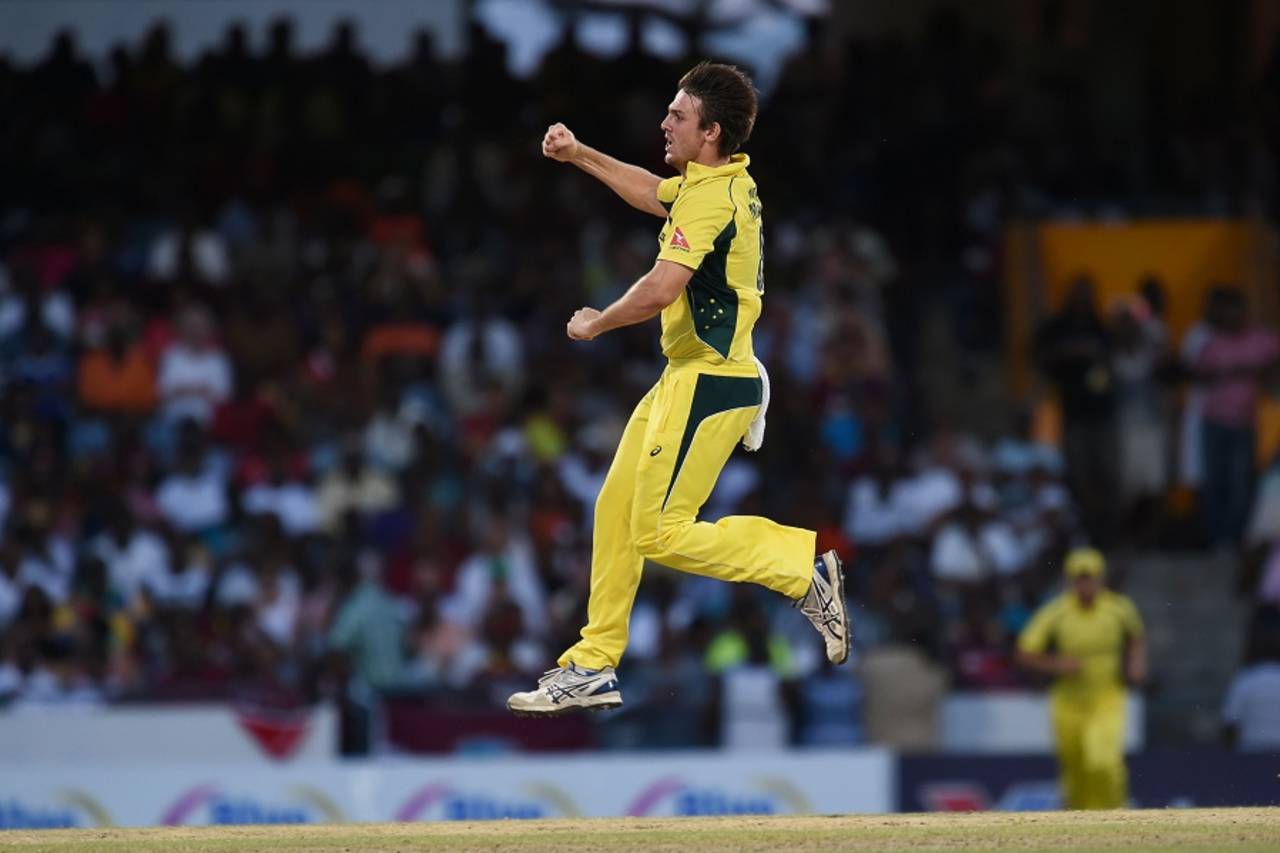On Sunday evening in Barbados, Australia lifted another one-day trophy. It was a fine achievement but not a new one: they have more silverware than Downton Abbey. In the past 18 months they have won a home tri-series, a World Cup, a series in England, a home campaign against India and now a tri-series in the West Indies. Only the Chappell-Hadlee Trophy slipped between their fingers.
They are the No.1-ranked ODI side in the world by quite a margin, so it is not especially remarkable that they won this series. All the same, there were notable Australian sub-plots. There was the dropping of Glenn Maxwell, followed by his
stunning display upon recall. There was the continued emergence of Adam Zampa as an exciting spinner with boundless confidence.
And there was the ongoing balancing act concerning James Faulkner and
Mitchell Marsh. Not long ago, Faulkner was one of the first men Australia would pick for a must-win ODI, the classic big-game player. Just look at the
World Cup final last year: Faulkner was Man of the Match for his 3 for 36, destroying New Zealand's middle order and their hopes of lifting the trophy.
Throughout that tournament Faulkner was preferred to Marsh as a pace-bowling allrounder, the conventional wisdom being they couldn't both squeeze into an XI that at the time also featured Shane Watson. Only once in that World Cup did Faulkner and Marsh play together, against Afghanistan, when experimenting was unlikely to matter.
The retirement of Watson made things a little easier, and most of Australia's ODIs in 2016 have featured Marsh, a batting allrounder typically at No.6, and Faulkner, a bowling allrounder at 7 or 8. But come the final of this tri-series against West Indies, the selectors decided that Faulkner was not part of their best XI. In his absence another big-game player emerged: Marsh was Man of the Match.
Justin Langer, Australia's coach for this tour,
said in the lead-up to this final that Marsh had the talent to eventually become Australia's No.4 batsman in all formats. Already they had moved Marsh up to No.5 at the back end of this series and he rewarded them with an unbeaten 79 in the win
against West Indies to qualify for the final.
Come the decider, Marsh walked to the crease at 120 for 3 in the 25th over, with some steadying required. Marsh steered Australia through those middle overs with 32 off 45 balls and in doing so reached 1000 ODI runs - in one fewer innings than it took Ricky Ponting. But his biggest contribution came in West Indies' chase. Called on in the 12th over, Marsh went for a single run from his first two overs, before switching ends and claiming three wickets in three overs.
And they weren't just any wickets: Darren Bravo, centurion from West Indies'
previous game, edged behind; Marlon Samuels, who had tormented Australia with
92 and
125 in their last two meetings, was undone by a slower ball; and then Johnson Charles, trying to guide the chase on 45, was trapped lbw. West Indies were 72 for 4, and Australia had one hand on the trophy.
"We knew, after our batting innings, that bowling from this end was going to be a lot easier for the bowlers, because it was quite thatchy up that end and the cross-seam balls were catching on the wicket a little bit," Marsh said after the win. "We tried to utilise this end and it came off for us.
"I haven't really taken a wicket all series, so it was nice to get a few tonight. I'm just enjoying the challenge of batting a bit higher up the order in the last couple of games ... Tonight I got an opportunity to bowl up front and try and be a bit attacking, and it came off."
It was the continuation of an excellent 2016 for Marsh in ODI cricket, after he scored his maiden hundred
against India at the SCG in January. Marsh is Australia's third-leading run scorer in ODIs this year (428 at 53.50), behind only Steven Smith and David Warner, and their second top wicket-taker (14 at 33.50) behind Josh Hazlewood.
By comparison, Faulkner has 10 wickets at 47.50 and has had few real chances with the bat, scoring 64 runs at 21.33 from seven innings. He is a far better player than that, a bowler who can turn a match in one spell, as Marsh did in this final, and one of the finest batting finishers in the world. He just needs to start grabbing his opportunities again, as Marsh has done.
Faulkner is too good a player to be left out for long, and will no doubt find his way back into the XI soon. But the more big strides Marsh continues to take, the more Faulkner will need to lift as well. Specifically, he needs wickets to encourage the selectors that he is a better option than a specialist fast bowler like Nathan Coulter-Nile, who was recalled for the tri-series final.
In a squad that also features Maxwell, balancing the all-round options won't get any easier for Australia's selectors.
Brydon Coverdale is an assistant editor at ESPNcricinfo. @brydoncoverdale
